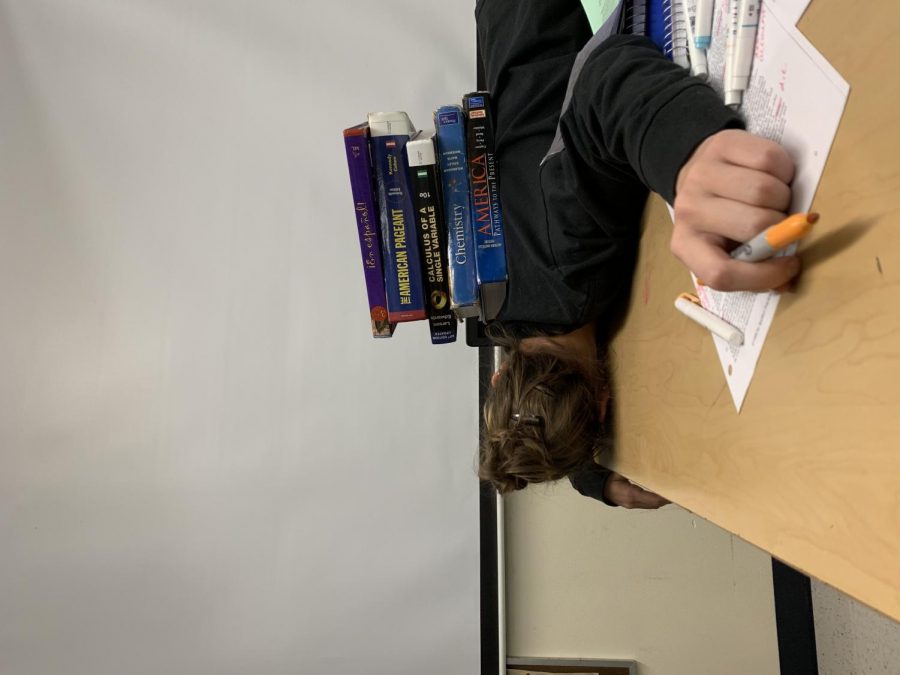She sits in the Little Theater, curling her hair to get ready for an extra production of the play “Radium Girls.” As she curls her hair, other students start to flow in with notes from teachers allowing them to miss parts of class. For many of these students, the sacrifice is not much, but for an AP student with a lot on her plate, senior Rebekah Kenney must prioritize her time to balance passion and schoolwork.
Between Drama club, Improv club, Key club, Model United Nations, National Honors Society, Albany Civic Theater, church, and five AP classes, Kenney has a lot to juggle. On an average day, she wakes up at 6 a.m., gets to school at 7:20 a.m., and relaxes in her car. She has AP classes first thing in the morning on both gold and blue days, goes to a club or the choir room for lunch, preps for college or a play during seventh period on blue days, stays at school for play practice, and typically, Kenney said, doesn’t get home until around 10 p.m.. After she’s home, she does homework until around 11:30 p.m.—or at least tries to be done by then.
This isn’t just the busy life of Kenney. Being a 4-year AP student has its pros, but it isn’t hard to see how being an overachiever poorly affects students. Senior Megan Cox says she’s “in a constant state of panic” with school work and clubs. Why do they do this? As an AP student myself, striving for Valedictorian, I can tell you we do it because we are hopeful the hard work pays off with success. However, the stress of being an AP student is often overlooked. As Cox says, “I am genuinely hopeful that all of this hard work pays off for long-term excellence.”
The number of sacrifices AP students make is absolutely ridiculous, and these sacrifices only make life more difficult, and in some ways unhealthy, for AP students. There are many times I have had to make a choice to miss out on a school game or event because I just had too much homework; not to mention how often I find myself forgetting to do things like eat, shower, or sleep.
This isn’t just a me problem, however. “I went to a soccer game [this year] and that was the first sporting event that I’ve been to that I wasn’t participating in since before school started freshman year,” Cox said. “I’ve gone to maybe three school dances and they’re some of the highlights of my high school career, they were so much fun, but just finding the time on a Saturday to be able to participate in that over your schoolwork is just incoherent.”
Senior Skylar Kim, whose schedule includes Calculus AB, AP Literature, AP Biology, and AP Chemistry, said, “Everyone’s going trick-or-treating, and I’m at home doing an AP Bio lab.”
All in all, those who have taken what seems to be an insane amount of AP classes—for Kenney, a total of 9; Cox, a total of 11; Kim, a total of 10; and me, a total of 7—make huge sacrifices for school and miss out on what can be some of the most memorable events of high school. However, Kim, Kenney, Cox, and I all feel like the work we put in now, although it causes unnecessary anxiety and unhealthy self-care habits, is important because it readies us for long-term success.
The saddest part of the AP student life is not the homework, but the lack of self care that comes with it. Kim said he often forgets to eat lunch because he’s too busy studying for a class. Kenney said she forgets to spend time with family. Cox said she couldn’t remember the last time someone sincerely asked her if she was okay.
Although it may seem as though we have all our you-know-what together, AP students are just as lost as the rest of high schoolers; we still are figuring out who we want to be, what we want to do, and how to balance life.
As USF College of Education Associate Professor Elizabeth Shaunessy-Dedrick Ph.D said to the USF College of Education Newspaper, “There’s an assumption since these [AP] kids are doing so well in school, they don’t need a whole lot of extra support. “There’s a misunderstanding of what the needs of these kids are.”
Shaunessy-Dedrick and Professor Shannon Suldo Ph.D. received a four-year grant in 2015 to study the effect of stress on AP students. Their research shows the academic pressure placed on AP students caused significantly increased levels of stress, mental health issues, and disengagement from school–while also reducing happiness and number of friendships these students have.
There is a pattern among the senior AP students interviewed: if they go to do something other than school work, someone, even if it’s themselves, feels as though they aren’t being productive enough. The stress of being an AP student can be very damaging mentally. Cox pointed out AP students run high anxiety, lack sleep, and have poor eating habits to balance schoolwork. As Kenney said, “[AP students are] like this because we need to be validated.” So, even if that one smart kid in your class looks like they have it all together, ask them if they are okay, and just check in. Be a friend. You never know how badly they might need it.


